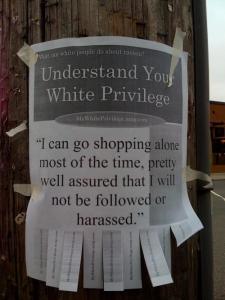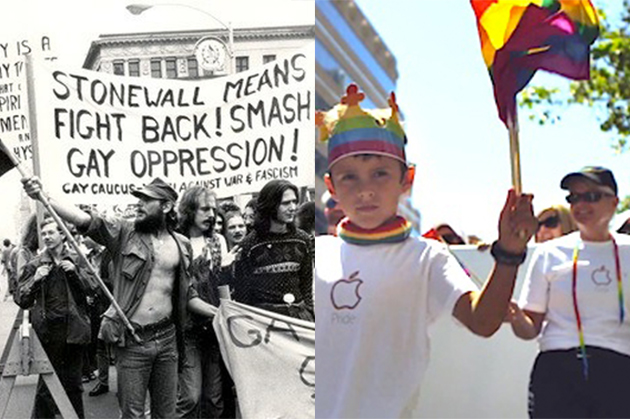I start the podcast by sharing the experience I had last weekend visiting the gay pride festival in Palm Springs, California. Palm Springs is a small city of about 45,000 people, just west of Los Angeles. Aside from its fame as a showcase for Mid-century Modern architecture, which overlays a cool calm on the blazing desert, it is known for its concentration of gays, estimated at 35-40% of the population. So gay pride is a big deal. This year they cordoned off ten blocks of the main downtown for shows, displays, and of course a big parade on Sunday morning. Twenty thousand visitors poured in to partake in three days of festivities.
And it was all…so civilized. There wasn’t a bare butt or breast in sight. Three or four guys in speedos were handing out fliers, but they seemed a bit self-conscious in the presence of all the children and their gay and straight parents. The whole extended family was there, grandma and grandpa too. The displays and parade floats were sponsored not only by gay organizations but by Well Fargo, Whole Foods and the local car dealers. Nobody was tossing condoms into the crowd. The parade featured the local high school bands and drill teams.
As a veteran of the gay pride happenings of the 70‘s and 80‘s, in the darker times of anti-gay legislation and the plague of AIDS, I must say I felt a certain loss. The spirit of being part of a tribe with a real fight on its hands has been subsumed by the reality of our victory and integration into the wider world.
 Back in the day, when my partner and I joined the Gay March on Washington we walked the streets proudly hand in hand — for the first time in public, tears streaming down our faces — with 500,000 other people who were bonded by the experience of having been shut out, frightened and often abused because of who they loved. The sense of stepping out of the shadows in all our glory was to experience a group identify and aliveness that I have not experienced since.
Back in the day, when my partner and I joined the Gay March on Washington we walked the streets proudly hand in hand — for the first time in public, tears streaming down our faces — with 500,000 other people who were bonded by the experience of having been shut out, frightened and often abused because of who they loved. The sense of stepping out of the shadows in all our glory was to experience a group identify and aliveness that I have not experienced since.
The gay rights movement of the late 20th century has substantially won its two big fights: 1) AIDS, which while not cured is manageable, and 2) social acceptance, with gay marriage now legal in 32 states and a comprehensive Supreme Court ruling expected next summer.
So last weekend was a bit of a lesson for me in the power of tribal identity and the pain of its loss. I have a better understanding of why people in today’s tribal cultures are not willing to give up their identity easily. Those of us who have do so are left with the sense that we have lost something precious. But I don’t wish to have it back any more than I wish to go back to childhood. There are bigger, higher battles to be fought, with comrades that are bound together more by creativity than necessity.
At integral consciousness we begin to be able to create new tribal connections, but this time they are more more memetic than genetic, more organized around ideas than blood relations. We’re able to experience the juice of being deeply bonded to all kinds of people in ways that are not exclusive but expansive.
HEALING RACISM BY POINTING OUT PRIVILEGE
 One of the key projects of the green altitude of development is to find and bring home those people who have been shut out of previous stages of development: the weak, the sinners, those who don’t have the opportunity to succeed. I often marvel that after millennia of cutthroat conflict and competition humanity’s next move is to become sensitive to the vulnerable and, like a fretful mother, we’re unable to rest until all of the family is at the table.
One of the key projects of the green altitude of development is to find and bring home those people who have been shut out of previous stages of development: the weak, the sinners, those who don’t have the opportunity to succeed. I often marvel that after millennia of cutthroat conflict and competition humanity’s next move is to become sensitive to the vulnerable and, like a fretful mother, we’re unable to rest until all of the family is at the table.
In the last sixty years as the cutting edge of culture has moved into mature orange and green altitudes, we have seen in the developed world the arising of large social movements such as feminism, civil rights and gay rights. These have met with huge success, particularly in the legal area where protection against racial and sexual discrimination has been won and is in the process of being won for gays. But, as all good integralists know, laws represent only the exterior structures of society. Discrimination continues in the interiors, in attitudes and feelings. So the fight for full equality has now been taken into these interior domains, particularly in progressive subcultures such as academia, with its growing emphasis on the subtle role of privilege.
There’s an important distinction between discrimination and privilege. Discrimination, such as racism, sexism and homophobia puts certain people at a disadvantage. Privilege puts certain people at an advantage, one that is often unseen and unacknowledged.
In these progressive subcultures if you are white, male or heterosexual (or god forbid, all three) you are reminded to “check your privilege” before you speak or act. At best this is a simple mindfulness instruction: pause for a moment and pay attention to how you may be enjoying unearned benefits that others don’t. Like all meditations it reveals unseen dimensions of reality, in this case a world of cultural expectations that unfairly empowers some people and disempowers others, one that shows up everywhere, whether hailing a cab, getting a job or simply being fully seen and heard in a conversation.
He dropped the “s” from his name and the job search experience changed.
Critics from the right (and sometimes from the left, such as Bill Maher) complain that progressives are being overly sensitive, politically correct and intolerant. They have a point. Having been a white man in a progressive academic setting a few years ago, I know first hand that green often over-corrects. I sometimes felt intimidated and disregarded in discussions where the voice of people from traditionally victimized groups were themselves “unfairly” privileged. This bothered me until I realized that there is a lot more at work here than simple fairness.
There is a more complex system of fairness that has to be considered, one that includes the karmas of history. This bigger view reveals that a process of restitution also wants to take place. One of the gifts of the integral view is that it shows us how contentious forces between groups of people can be understood by seeing how they arise between individual people. Think of a husband who after years of abusing his wife finally wakes up and changes his ways. Does a mere apology fix things? No. He cannot simply wipe the slate clean and expect to move on. He has to recover lost ground. And ultimately there’s only one way to do that:
He has to show her that he sees and understands what he has put her through. No amount of apologies, excuses or explanations will bring the relationship back unless and until this happens. It takes place as he surrenders, when he is able to witness and listen to her pain with his heart as well as his head. When he is able to show her that he can allow some part of her experience into his psyche, utterly undefended, he has a chance.
Thus it is with the healing of our present day cultural wounds, which are rooted in millennia of abuse. A form of restorative justice is required. Conservatives will retort that while this may make sense in personal relationships, no one should be held responsible for what their ancestors did to someone else’s ancestors.
We may not be held responsible for the actions of our ancestors, but the effects of those actions are still infecting the body politic, and we are responsible for healing them. The laws of karma – simple cause and effect – show us how the consciousness and culture of peoples are passed through the generations as surely as are their genes.
Fortunately the cure is easy — and deeply rewarding. All people ultimately want from each other is to be seen, heard and received for the unique and precious creations that they are. So we do this whenever we can, with whoever we can, as an act of love.
AT LEAST HE DIDN’T BLAME HIM FOR BENGHAZI
I end the podcast by addressing a comment I received from a reader that is a perfect critique of Obama from the left. I’ll reprint it here:
Jeff — an ‘Obamapologist’? Really? Of course, like the rest of us progressives, you like what he SAYS. But look at what he DOES, at his actual policy decisions. After accepting a Nobel Peace Prize (!), he’s become a serial killer who is ‘comfortable’ with selecting names from a weekly ‘kill list’ for so-called targeted drone attacks that have killed more than 2000 people so far, most of them civilians, including old men, women, children, brides, grooms, et al. in at least 6 countries. He reserves the right to assassinate American citizens and others without due process. He ramped up the illegal war in Afghanistan and now renews his commitment to aggressive war in Iraq, after earlier participating in the disastrous attack on Libya. He looks the other way as Israel systematically bombs and starves the citizens of Gaza, reducing them to the condition of junkyard dogs. He violates the Constitution by refusing to prosecute high crimes committed by top officials of the Bush administration. He’s a corporatist who lets the Justice Department pass on indicting ‘too big to jail’ CEO’s of the predatory Wall Street Banks that nearly destroyed the financial system. He leads no fight to raise taxes on corporations, nor to strengthen labor unions, nor to eliminate massive subsidies to agricultural, energy, and other industries. He does nothing about the world’s largest prison population, a huge percentage of which consist of black youth stuck there for petty crimes. He continues to deport record numbers of undocumented workers. He has persecuted and prosecuted record numbers of whistleblowers and journalists. He supports the horrendous TPP agreement. He has authorized billions to upgrade the U.S.’s nuclear arsenal. I could go on.
That’s a lot that needs defending. As an Obamapologist you’ve got a heavy stone to roll. As an integralist, you shouldn’t even be trying. As Ken Wilber has written, every stage of development has its triumphs and disasters. Obama, I’m afraid, has become an agent of disaster, and no integralist should be afraid to say so.
My short answer to this critique of President Obama can be summed up in eight words: President John McCain and Vice President Sarah Palin.
If you’d like to know my longer answer, I invite you to listen to the podcast.
Till next week, keep it integral!
Podcast: Download
Subscribe: Google Podcasts | RSS







In my limited understanding of the integral approach to politics, a requirement is to see the value of the various stages in terms of what each brings to understanding and responding to an issue. I would like to see more of this in an analysis of current events. I commend Jeff Salzman and others who have, however imperfectly, endeavored to engage this mode of thinking. It will doubtless be of great benefit to me as I stumble in my efforts to apply theory “bodily”. “Being bonded to all kinds of people in ways that are not exclusive but expansive “, what a wonderful direction to take n whatever time I have left.
Finally I am finding a resonant language and perspective to grapple with the complexities of life, conversation and more importantly finding an intelligent peace of mind from Jeff’s integral thinking. I very well may be able to confidently call myself……an Integralist….proudly! This is my first podcast and the white privilege discussion was spot on for me and very helpful.
Thanks for what you do and provide Jeff….thank you for this service. Greatly appreciated!
Deep Bow
As always, a great article. Thanks, Jeff. Great juxtaposition of images at the top of the page.
The entire “white (male/heterosexual/…) privilege piece really touched something in me. I too tended to want to be quick to dismiss some of it as “overreaching green” but there is truth in your statement that “here is a lot more at work here than simple fairness “. There is something very powerful about truly letting in the pain of the experience of disenfranchised groups (in a very personal way), especially when one feels that one isn’t personally “at fault”.
Thanks you also for Bret’s great way of reading our comments during the calls. I felt well-represented when he read my comment on an earlier call and also thought he read the comment about Obama with great intonation…made us all sound smart and reasonable! 😉
Anyway: I mainly wanted to bring this article to your attention: The word “Integral” isn’t mentioned in it, but in my opinion it could easily be describing an integral awakening. So: Are we mainstream yet?
http://www.huffingtonpost.com/dianne-collins/theres-a-new-mainstream-o_b_6146988.html
great article Jeff. Thank you. And a great comment included at length, toward the end. Appreciate that you included that, as well.